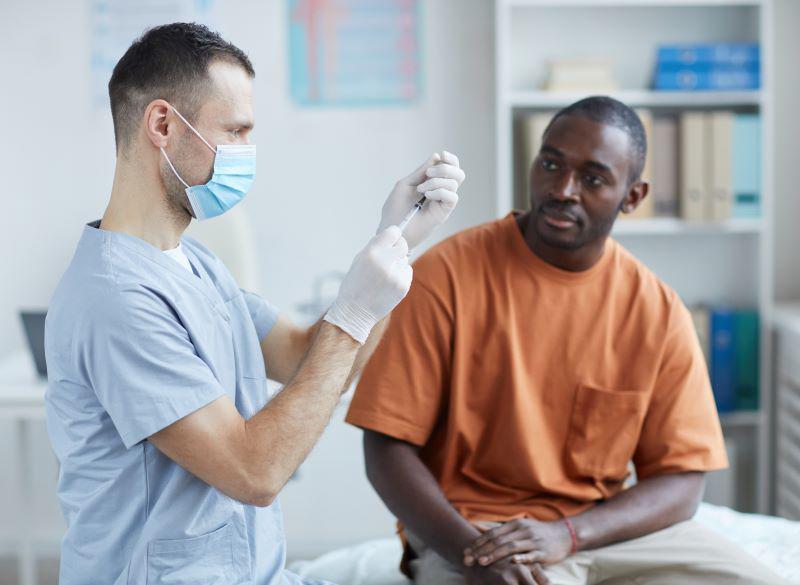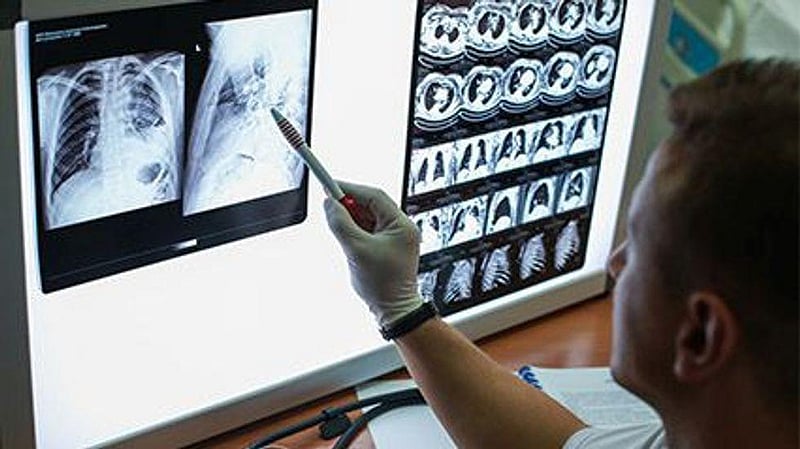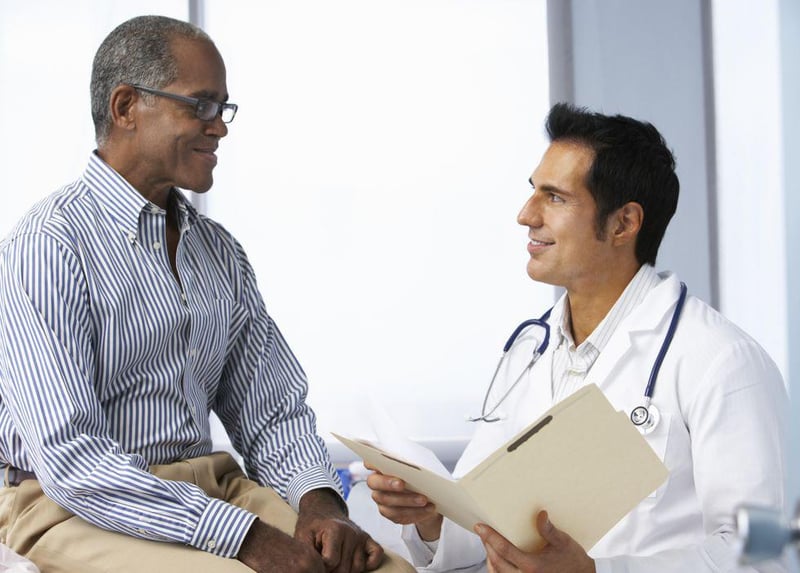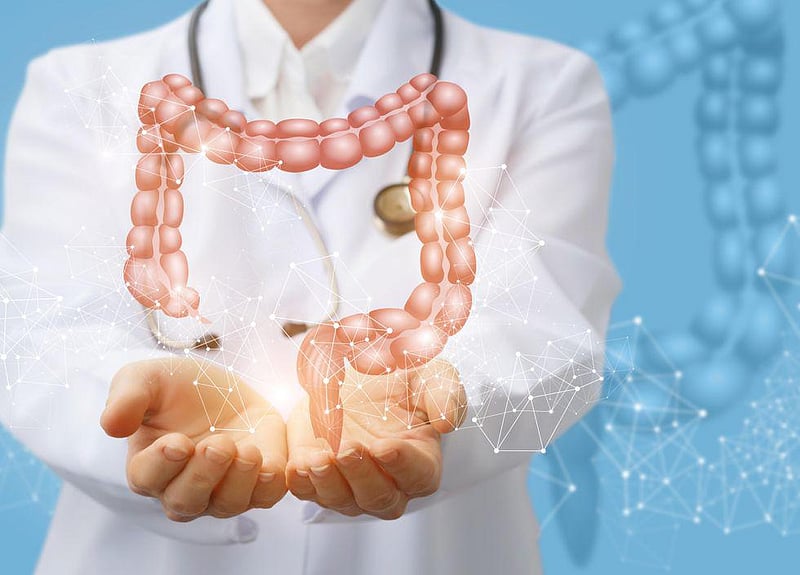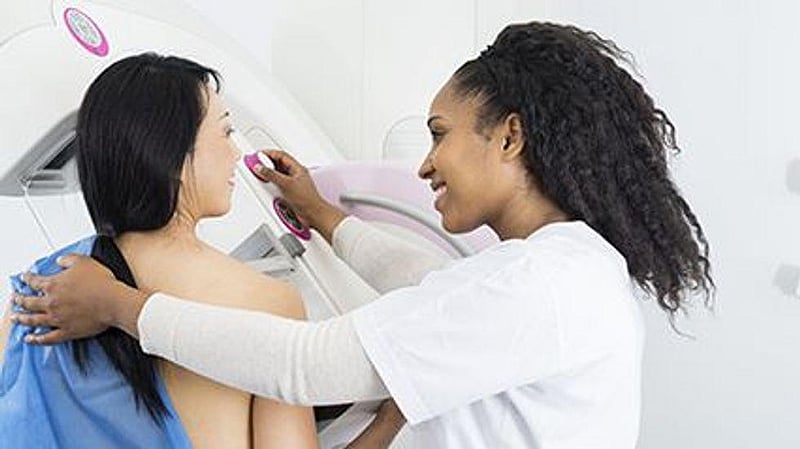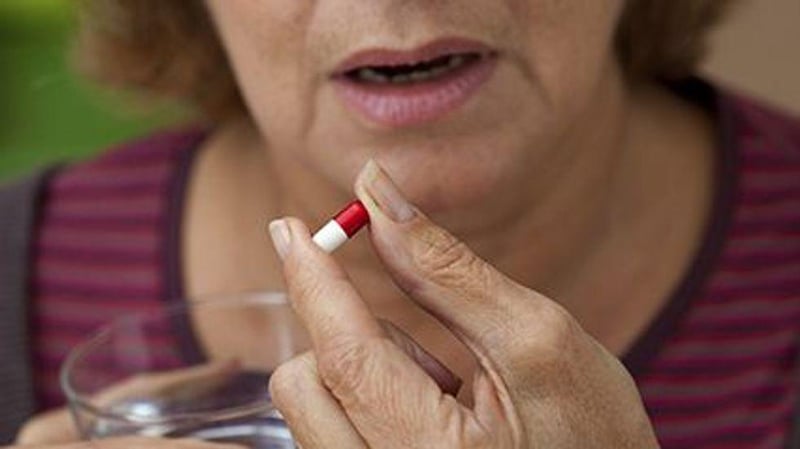Get Healthy!
182 Results for search "Cancer: Colon".
Health News Results - 182
President Joe Biden announced Wednesday that he is giving a new push to the cancer moonshot initiative that he first led during the Obama administration.
In his announcement, Biden said the program would aim to boost prevention, screening and research with a target of reducing the cancer death rate by 50% over the ne...
- Robert Preidt and Robin Foster
- |
- February 3, 2022
- |
- Full Page
Colon cancer rates are increasing for younger Americans, along with rates of obesity. Could slimming down reduce young people's risk for malignancy?
A new study suggests that even a small amount of weight loss may cut your odds for benign growths in the colon known as adenomas, or polyps. Left unchecked, these growths can lead to
- Cara Murez HealthDay Reporter
- |
- February 1, 2022
- |
- Full Page
Yet another study is chipping away at the idea that colon and rectal cancers are diseases of older age: In the past couple decades, Americans younger than 40 have shown the steepest rise in advanced cases of these cancers.
The research adds to evidence of a disturbing, and not yet completely understood, increase in early-onset
Most American adults don't know that alcohol boosts cancer risk, but a majority support steps to increase awareness of the link, a new nationwide survey shows.
""It is important that people are made fully aware of the potential harms of alcohol so that they may make informed decisions about alcohol consumption," said study author Kara Wiseman. She's an assistant professor of public health...
- Robert Preidt
- |
- January 31, 2022
- |
- Full Page
Big surprise bills for any colonoscopy done after a positive result from a stool-based screening test will be prevented under new federal rules, a group of U.S. medical organizations say.
On Jan. 10, the Biden administration issued guidance requiring private insurers to cover such colonoscopies.
The guidance exp...
- Robert Preidt
- |
- January 19, 2022
- |
- Full Page
Many insured cancer patients still experience serious money problems linked to their illness, new research affirms.
For example, nearly 3 out of 4 insured patients with colon cancer have major financial hardship in the year after their diagnosis, which affects their social functioning and quality of life, according to
Cancer remains a major killer, with 10 million deaths reported worldwide in 2019.
More than 23 million new cases were documented globally in 2019, according to researchers at the University of Washington School of Medicine.
By comparison, in 2010 there were 8.29 million cancer deaths worldwide and fewer than 19 million new cases. Deaths were nearly 21% higher in 2019 than 2010, and...
- Cara Murez
- |
- January 4, 2022
- |
- Full Page
Many cancer patients take dietary supplements in hopes of keeping their disease at bay, but British researchers say there's little evidence it will pay off.
In fact, they add, supplements may not only be ineffective, but harmful as well.
"We found 1 in 5 people who had been treated for cancer mistakenly thought that taking vitamins or other supplements would help reduce the ris...
- Steven Reinberg HealthDay Reporter
- |
- December 20, 2021
- |
- Full Page
New research offers fresh proof that the COVID-19 pandemic delayed cancer diagnoses in the United States, increasing patients' risk for poor outcomes.
For the study, researchers analyzed data from more than 9 million patients at over 1,200 Veterans Affairs (VA) medical facilities.
Procedures to diagnose cancer were used less often and there were fewer new cancer diagnoses in 2020 t...
- Robert Preidt
- |
- December 6, 2021
- |
- Full Page
U.S. cancer clinical trial participants have become more diverse in makeup, but certain groups remain underrepresented, a new study finds.
It's important to have a wide range of participants in clinical trials, to find out if treatments are safe and effective for people with different characteristics, according to the National Cancer Institute (NCI), which has a number of initiatives to b...
- Robert Preidt
- |
- November 30, 2021
- |
- Full Page
President Joe Biden is undergoing a routine colonoscopy Friday, and will briefly transfer power to Vice President Kamala Harris while he's sedated for the procedure, the White House said.
The colonoscopy will be part of Biden's first routine physical exam as president, and will take place at Walter Reed National Military Center.
"As was the case when President George W. Bush had the...
- Dennis Thompson
- |
- November 19, 2021
- |
- Full Page
People who were exposed to a particular hormonal medication in the womb may have a heightened risk of cancer later in life, a new study suggests.
Researchers found the increased cancer risk among adults whose mothers had been given injections of a synthetic progesterone known as 17-OHPC, or 17P, during pregnancy. The study participants were born in the 1960s, when the drug was used to hel...
- Amy Norton HealthDay Reporter
- |
- November 15, 2021
- |
- Full Page
Younger patients with advanced colon cancer don't live longer than older patients, but it's unclear why, researchers say.
The authors of the new study said they were surprised by the findings, which come as colon cancer rates are on the rise among young Americans.
"As a group, younger patients are more physically active and have higher performance status and are better able to perfo...
- Robert Preidt
- |
- October 28, 2021
- |
- Full Page
Black American women with low levels of vitamin D have higher odds of developing colon cancer, according to a new research that echoes previous findings in white women.
Researchers used a vitamin D prediction model for nearly 50,000 participants in the Black Women's Health Study and concluded that those with predicted levels in the bottom 25% had an estimated 40% higher risk of colon canc...
- Robert Preidt
- |
- October 27, 2021
- |
- Full Page
American cancer patients spent more than $21 billion on their care in 2019, a new report shows.
That $21.09 billion included out-of-pocket costs of $16.22 billion and patient time costs of $4.87 billion. Patient time costs are the value of the time patients spend traveling for, waiting for and receiving care.
"As the costs of cancer treatment continue to rise, greater attention to a...
- |
- October 26, 2021
- |
- Full Page
Private insurers paid out about $156.2 billion in 2018 for U.S. patients with the 15 most common cancers.
Medication was the largest expense and drugs for breast, lung, lymphoma and colon cancers accounted for the largest chunk of those costs, according to a Penn State College of Medicine study.
"The public often hears that the U.S. spends an inordinate amount of money on health car...
- Robert Preidt
- |
- October 13, 2021
- |
- Full Page
Colon cancer numbers dropped dramatically during the COVID-19 pandemic, but that doesn't mean fewer people have the disease.
In Spain, researchers discovered a more than 40% decline in colon cancer diagnoses, leading experts to worry about the ramifications.
"These are very worrying findings indeed -- cases of colorectal cancer undoubtedly went undiagnosed during the pandemic. Not o...
- Cara Murez
- |
- October 4, 2021
- |
- Full Page
A pair of experimental tests could help doctors detect colon or prostate cancer with just a sample of blood or saliva.
One test examines a person's blood for four biomarkers linked to inflammation. In a small study, it outperformed the fecal blood test now used in colon cancer screening, said lead researcher Dr. Mona Eldeeb, of Alexandria University Medical Research Institute in Egypt.
- Dennis Thompson HealthDay Reporter
- |
- September 29, 2021
- |
- Full Page
There's good news for health-conscious sausage and bacon lovers.
A new study suggests the Japanese knotweed plant could be used to make healthier cured meats.
According to researchers, this fast-growing plant that invades gardens and buildings contains a chemical that could take the place of the preservative nitrite, which has been linked to cancer, in cured meats. That might not on...
- Steven Reinberg
- |
- September 24, 2021
- |
- Full Page
Multiple sclerosis (MS) patients diagnosed with colon cancer may have a greater risk of dying from cancer or other causes in the next six months to year than colon cancer patients without MS, a Canadian study finds.
"These results warrant further investigation to determine what factors may lead to shorter survival times," said study author Dr. Ruth Ann Marrie, a professor of neurology at ...
- Steven Reinberg
- |
- September 16, 2021
- |
- Full Page
Colon cancer risk runs in families, and it's not just a parent or sibling having had the disease that should concern you.
If you have a second- or third-degree relative who had colon cancer at an early age, your odds of having the disease substantially increase, a new study finds.
First-degree relatives include parents, children and siblings. Second-degree relatives include aunts, u...
- Steven Reinberg
- |
- September 15, 2021
- |
- Full Page
Here's another reason to avoid unnecessary use of antibiotics: Long-term use of these medications could increase your risk of colon cancer, researchers say.
"While in many cases antibiotic therapy is necessary and saves lives, in the event of less serious ailments that can be expected to heal anyway, caution should be exercised. Above all to prevent bacteria from developing resistance but...
- Robert Preidt
- |
- September 2, 2021
- |
- Full Page
Foods rich in vitamin D may help protect younger adults against colon cancer, researchers report.
While colon cancer is decreasing overall, cases among younger adults have been on the rise. The trends dovetail with a decline in vitamin D intake from foods such as fish, mushrooms, eggs and milk.
There is growing evidence of a link between vitamin D and risk of colon cancer death, but...
- Robert Preidt
- |
- August 18, 2021
- |
- Full Page
Immunotherapy helped extend the lives of some patients with the most common type of advanced colon cancer, researchers report.
The new findings are important, they noted, because immunotherapy doesn't typically work against microsatellite stable (MSS) colon cancer. These patients have few treatment options once their disease no longer responds to chemotherapy.
This study included 95...
- Robert Preidt
- |
- August 11, 2021
- |
- Full Page
Colonoscopy screening can help prevent colon cancer by allowing doctors to find and remove potentially pre-cancerous growths called polyps. But if they fail to get the whole growth, the odds of a recurrence are high, a new study shows.
The likelihood that it will occur within the next few years more than doubled.
Repeat exams found a new growth in the same colon segment 52% of the t...
- Amy Norton HealthDay Reporter
- |
- August 10, 2021
- |
- Full Page
Don't believe everything you read on social media about cancer and cancer treatment.
A new study finds that one-third of the most popular articles on social media about treatment for common cancers contains misinformation -- and most of it can be downright dangerous.
"The worst-case scenario is when it leads to a person declining proven cancer treatments in favor of a treatment tha...
- Denise Mann HealthDay Reporter
- |
- July 28, 2021
- |
- Full Page
There's some encouraging news for U.S. teens and young adults with cancer.
Survival rates have improved for several types of cancer, though gains have been limited for some common kinds, according to a long-term study published online July 26 in the journal Cancer.
The researchers used a wealth of accumulated data "to piece together a larger part of the cancer survival st...
- Robert Preidt
- |
- July 28, 2021
- |
- Full Page
A major U.S. hospital system had a strong rebound in most cancer screening tests after a steep drop-off in the early months of the COVID-19 pandemic, a new study shows.
The findings are based on an analysis of data from the Boston-based Mass General Brigham system. Depending on the type of test, between March and June of 2020, the number of cancer screenings dropped off between 65% a...
- Robert Preidt
- |
- July 12, 2021
- |
- Full Page
Americans' overall death rate from cancer continues to fall -- but rising rates of certain cancers and ongoing racial disparities linger.
Those are among the findings of an annual report to the nation from several major cancer organizations.
The good news includes an accelerating decline in the overall cancer death rate, among both women and men, and across racial and ethnic groups....
- Amy Norton HealthDay Reporter
- |
- July 8, 2021
- |
- Full Page
Antibiotics may increase the risk of colon cancer, especially in younger people, U.K. researchers report.
"To our knowledge, this is the first study to link antibiotic use with the growing risk of early-onset colon cancer -- a disease which has been increasing at a rate of at least 3% per year over the last two decades," said study co-author Sarah Perrott, a cancer researcher at the Unive...
- Robert Preidt
- |
- July 6, 2021
- |
- Full Page
New research finds that countries with more cloudy days tend to have higher colon cancer rates. Lower levels of vitamin D, the "sunshine vitamin," may be to blame.
So, boosting your vitamin D levels through exposure to sunlight could help reduce your risk of colon cancer, according to researchers at the University of California, San Diego.
"Differences in UVB [ultraviolet-B] li...
- |
- July 5, 2021
- |
- Full Page
You decide to take a popular colon cancer screening test that can be performed at home, and it comes back positive. A follow-up colonoscopy is scheduled, but then you suddenly receive a large and unexpected medical bill.
That's what happened to a Missouri woman who was hit with $1,900 in medical expenses after using the popular at-home colon cancer screening test called Cologuard.
<...
- Robert Preidt and Robin Foster HealthDay Reporters
- |
- June 28, 2021
- |
- Full Page
Could a new one-and-done blood test designed to detect as many as 50 different types of cancer become a diagnostic game changer?
Yes, say researchers, who report the method appears accurate and reliable at identifying and locating cancer, including some kinds for which there are now no effective screening methods.
"[The test] sets the stage for a new paradigm of screening individual...
- Alan Mozes HealthDay Reporter
- |
- June 25, 2021
- |
- Full Page
Many people with heart failure take a cholesterol-lowering statin, and new research suggests those pills might also lower their odds for cancer.
Researchers analyzed data from more than 87,000 people in Hong Kong who had no history of cancer and were hospitalized for heart failure between 2003 and 2015.
They were followed until they were diagnosed with cancer, died or until the end ...
- Ernie Mundell and Robert Preidt HealthDay Reporters
- |
- June 24, 2021
- |
- Full Page
If you're over 75, being screened for colon cancer could save your life, a new study says.
This week, the influential U.S. Preventive Services Task Force lowered the recommended age to begin colon cancer screening from 50 to 45 for people without a family history of colon cancer, but did not change its advice to halt routine screening at age 75.
After that age, the decision to be s...
- Robert Preidt
- |
- May 21, 2021
- |
- Full Page
Colon cancer is on the rise among people under 50, and the million-dollar question is why.
Now, new research suggests that certain lifestyle factors, such as eating lots of red meat and heavy alcohol consumption, may play a role in this increase.
"The occurrence of colorectal cancer in people less than 50 years of age is increasing in many countries, but the causes of this are poorl...
- Denise Mann HealthDay Reporter
- |
- May 20, 2021
- |
- Full Page
A lot of people think of age 50 as the magic number for getting a first colonoscopy, but earlier is better, a prestigious U.S. expert panel now says.
Based on evidence that younger people are being diagnosed with colon cancer and would benefit from screening, the U.S. Preventive Services Task Force (USPSTF) is moving the recommended age for colon cancer screening from 50 to age 45.
- Cara Murez HealthDay Reporter
- |
- May 18, 2021
- |
- Full Page
Being obese or overweight can increase the odds of developing several types of cancers, new research from the United Kingdom reveals.
But shedding the excess pounds can lower the risk, researchers say.
Reducing obesity cuts the risk for endometrial cancer by 44% and uterine cancer by 39%, and could also prevent 18% of kidney cancers and 17% of stomach and liver cancers, according t...
- Steven Reinberg HealthDay Reporter
- |
- May 10, 2021
- |
- Full Page
Rates of colon cancer among young Americans are on the rise, and a new study suggests that drinking too many sugary beverages may be to blame -- at least for women.
Women who drank two or more sugar-sweetened beverages such as soda, fruity drinks or sports and energy drinks per day had double the risk of developing colon cancer before the age of 50, compared to women who consumed one or ...
- Denise Mann HealthDay Reporter
- |
- May 7, 2021
- |
- Full Page
Having close relatives with colon polyps -- which can be precursors of cancer -- could mean that you have a higher risk for colon cancer, researchers say.
Colon cancer is the second deadliest form of cancer in the world, according to the World Health Organization.
Being overweight and inactive increases the risk, but genetics also play a role, researchers in Sweden and Boston said ...
- Robert Preidt
- |
- May 5, 2021
- |
- Full Page
Nearly 10 million cancer screenings have been missed in the United States during the coronavirus pandemic, researchers report.
The investigators analyzed data on three types of cancer for which early screenings are most beneficial -- breast, colon and prostate -- and found that 9.4 million screenings for these cancers did not occur in the United States due to COVID-19.
Screenings fo...
- Robert Preidt
- |
- May 5, 2021
- |
- Full Page
The first device that uses artificial intelligence (AI) to help detect possible signs of colon cancer during colonoscopy has been approved by the U.S. Food and Drug Administration.
The GI Genius uses AI-based machine learning to help identify lesions such as polyps or suspected tumors in real time during a colonoscopy, according to the agency.
"Artificial intelligence has the potent...
- Robert Preidt
- |
- April 13, 2021
- |
- Full Page
At first glance, it appears that little will change between now and 2040 when it comes to the types of cancers that people develop and that kill them, a new forecast shows.
Breast, melanoma, lung and colon cancers are expected to be the most common types of cancers in the United States, and patients die most often from lung, pancreatic, liver and colorectal cancers, according to the lates...
- Dennis Thompson HealthDay Reporter
- |
- April 8, 2021
- |
- Full Page
A few years ago, Dr. Joseph Shrager, a professor of cardiothoracic surgery at Stanford University School of Medicine, noticed that lung cancer diagnoses were noticeably higher at age 65 than at slightly older or younger ages.
"There was no reason rates should differ much between the ages of 63 and 65," Shrager said.
He discussed this with his colleagues, who said they were seeing so...
- Robert Preidt
- |
- April 7, 2021
- |
- Full Page
When it comes to guarding against colon cancer, what you eat is everything.
You can reduce your risk of colon cancer by eating five food types, an expert says. These include: vegetables; whole grains; legumes; nuts and seeds; and fiber-rich fruit.
"Vegetables contain cancer-preventing nutrients called carotenoids and flavonoids," said Amy Rosenfeld, program coordinator of community ...
- |
- April 3, 2021
- |
- Full Page
New research offers insight into why regular, long-term use of low-dose aspirin may reduce the risk of death from colon and rectal cancers.
Resarchers found that aspirin prevents blood cells called platelets from producing an enzyme that allows them to clump together. Tumor cells can attach to these clumps and spread (metastasize) throughout the body.
"Aspirin inhibits platelet act...
- Robert Preidt
- |
- March 31, 2021
- |
- Full Page
Obesity may shorten the lives of patients with certain types of cancers, but not others, a new research review concludes.
The analysis, of more than 200 studies, found that across numerous cancers, obesity was linked to shorter survival. The list included breast, colon, prostate, uterine and pancreatic cancers.
On the other hand, patients with lung, kidney or melanoma skin cancer al...
- Amy Norton HealthDay Reporter
- |
- March 30, 2021
- |
- Full Page
Many people may have postponed cancer screenings during the coronavirus pandemic, but a major medical group says now is the time to catch up.
The American College of Surgeons Commission on Cancer is urging people to resume recommended cancer screenings to prevent further delays that could lead to diagnosis after a cancer is more advanced.
"Regular cancer screening tests can improve...
- Cara Murez
- |
- March 29, 2021
- |
- Full Page
Kids born to moms who took a drug widely used to prevent miscarriages in the 1950s and 1960s may be twice as likely to develop cancer in adulthood.
The drug in question, hydroxyprogesterone caproate, also known as OHPC or 17-OHPC, is a man-made version of the hormone progesterone. It is no longer used to reduce the chances of miscarriage, but it's still prescribed to prevent preterm birth...
- Denise Mann HealthDay Reporter
- |
- March 24, 2021
- |
- Full Page
After a sharp drop early in the COVID-19 pandemic, rates of routine breast and colon cancer screening soon returned to near-normal levels, a new study finds.
"These are the first findings to show that, despite real fears about the consequences of drop-off in cancer screens, health facilities figured out how to pick this back up after the initial pandemic restrictions," said lead study aut...
- Robert Preidt
- |
- March 24, 2021
- |
- Full Page



